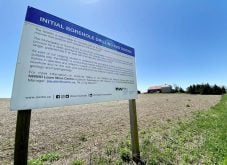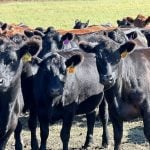The vaccine mandate on truck drivers entering Canada has stirred a wasp nest of criticism from many sectors, not least from those who work in logistics and transport.
Representatives of Ontario’s agricultural commodities are among those calling for a reversal of the mandate.
“We’re very concerned. That’s the number one feeling among the organizations in the beef sector,” says Richard Horne, executive director for Beef Farmers of Ontario. Animal transport is only part of the problem, he adds. The movement of feed, supplies and equipment is also affected.
Read Also

Canada seventh-most influential country on agri-food
Report from Dalhousie University and MNP shows Canada ranks seventh among G20 countries on agri-food influence.
Why it matters: The vaccination mandate, imposed on the trucking industry by the Canadian government, is expected to cause significant disruptions in an already strained transportation sector and supply chain.
Horne says BFO and other groups previously supported a letter asking government to reverse or amend the trucker vaccine mandate policy so driver and truck shortages didn’t worsen. The federal government responded with intentions to stick with the mandate.
“The biggest question I’m hearing is farmers and industry are not sure what’s being accomplished with this mandate…I don’t think it’s anything to do with pro-vaccine or not. It’s about keeping the supply chain moving,” says Horne.
John de Bruyn, chair of Ontario Pork, expresses similar sentiments. In an email, he highlighted ongoing difficulties with animal transport amid on-farm labour shortages, plant slowdowns and closures.
“Ontario Pork members market roughly 110,000 hogs each week to meet demand from domestic and export markets. The supply chain has limited flexibility to handle any disruptions,” de Bruyn says.
“With already limited processing options in the province being further reduced due to labour challenges, more animals must be moved out of province. At the same time, farmers who export animals to the U.S., or processing partners who depend on moving pork out of the province, are now facing challenges in finding qualified drivers able to transport their product…
“After almost two years of challenges related to COVID-19, the sustainability of Ontario’s pork sector relies on finding ways to ensure the supply chain remains intact, that pigs continue to move, and that pork reaches consumer tables.”
Labour challenges are central to concerns expressed by Grain Farmers of Ontario. Chair Brendan Byrne says transportation problems continue to increase the cost of doing business. A wider conversation about the importance of reliable transport is required.
“Trucker shortages have delayed shipping of products and increased costs. The lack of truckers is further exacerbated by the increase in supply chain challenges created by the pandemic and crossing the border,” Byrne says.
“Farmers need to get their crops to market and we urge the federal government and the province of Ontario to recognize these challenges on truck transportation and put in place an immediate plan that ensures the agriculture supply chain is not disrupted.”
He says the transportation industry is the best choice to develop such a plan, along with the Canadian Manufacturers and Exporters.
“We hope the federal government is engaging with them to resolve this,” Byrne stated.
Customer prioritization
Though the full impact of the federal mandate remains to be seen, Horne is concerned about the diversion of scant resources to larger customers. Smaller farmers and those who ship less frequently will bear the brunt of the transportation crunch.
The impact of vaccine refusal could also have a disproportionate impact on smaller trucking companies, says Russel Hurst, executive director for the Ontario Agri Business Association.
Larger fleets will be better able to adapt to employee refusals but one or two holdouts at small companies can prove paralyzing.
Hurst believes the strain is of greatest concern now to the livestock sector, due to the specialized nature of livestock transportation and the fact that the grain sector is quieter during winter.
“One of the challenges of this absolute vaccine mandate is, why now? Why now, two years in, and realizing the business stress this causes?” says Hurst.
“It shows how fragile supply chains can be, even with these little shocks.”















